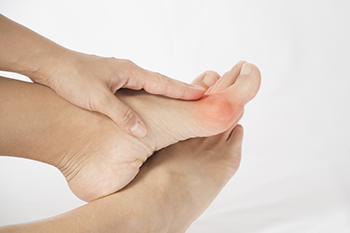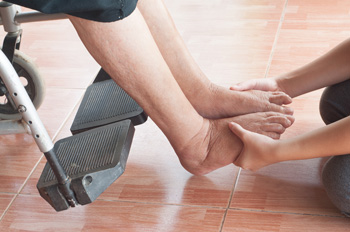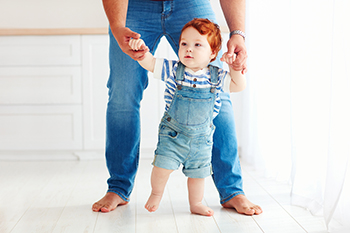Connect With Us
Blog
Items filtered by date: June 2021
Should I Get Bunion Surgery?
 Bunions are a common foot deformity in which a bony bump slowly grows along the outside of the foot at the base of the big toe joint. Bunions can be painful, making walking and finding comfortable shoes particularly difficult. Conservative treatments such as resting and icing the foot and shoe modifications are usually the first line of treatment to address bunion symptoms and slow or prevent progression. However, surgery is also an option and can be used to relieve pain, improve foot stability, restore walking ability, improve the appearance of the foot, and prevent other deformities from developing. Whether or not you should consider surgery depends on the severity of the bunion, the impact that symptoms have on your daily life, and the presence of any other health conditions. To learn more about treatment options for bunions, please consult with a podiatrist.
Bunions are a common foot deformity in which a bony bump slowly grows along the outside of the foot at the base of the big toe joint. Bunions can be painful, making walking and finding comfortable shoes particularly difficult. Conservative treatments such as resting and icing the foot and shoe modifications are usually the first line of treatment to address bunion symptoms and slow or prevent progression. However, surgery is also an option and can be used to relieve pain, improve foot stability, restore walking ability, improve the appearance of the foot, and prevent other deformities from developing. Whether or not you should consider surgery depends on the severity of the bunion, the impact that symptoms have on your daily life, and the presence of any other health conditions. To learn more about treatment options for bunions, please consult with a podiatrist.
If you are suffering from bunions, contact one of our podiatrists of Comprehensive Foot & Ankle Centers. Our doctors can provide the care you need to keep you pain-free and on your feet.
What Is a Bunion?
A bunion is formed of swollen tissue or an enlargement of boney growth, usually located at the base joint of the toe that connects to the foot. The swelling occurs due to the bones in the big toe shifting inward, which impacts the other toes of the foot. This causes the area around the base of the big toe to become inflamed and painful.
Why Do Bunions Form?
Genetics – Susceptibility to bunions are often hereditary
Stress on the feet – Poorly fitted and uncomfortable footwear that places stress on feet, such as heels, can worsen existing bunions
How Are Bunions Diagnosed?
Doctors often perform two tests – blood tests and x-rays – when trying to diagnose bunions, especially in the early stages of development. Blood tests help determine if the foot pain is being caused by something else, such as arthritis, while x-rays provide a clear picture of your bone structure to your doctor.
How Are Bunions Treated?
- Refrain from wearing heels or similar shoes that cause discomfort
- Select wider shoes that can provide more comfort and reduce pain
- Anti-inflammatory and pain management drugs
- Orthotics or foot inserts
- Surgery
If you have any questions, please feel free to contact our offices located in Shepherdsville and Louisville, KY . We offer the newest diagnostic and treatment technologies for all your foot care needs.
Heel Pain in the Morning?
Why Feet Swell During Pregnancy
 Swelling in the feet and legs during pregnancy is very common, and it usually worsens towards the end of the day and further into the pregnancy. The swelling is the result of the body holding more water than usual, and the water pools up at the lower parts of the body. This swelling is not usually harmful, but it can get uncomfortable. However, a sudden increase of swelling can be a sign of pre-eclampsia and should be monitored as soon as possible. Common methods to reduce lower limb swelling include avoiding standing for long periods, wearing comfortable shoes and socks that aren’t too tight, resting with the feet up, and taking regular walks. If you are struggling with swollen feet during your pregnancy, a podiatrist will be able to help provide ways to manage the situation.
Swelling in the feet and legs during pregnancy is very common, and it usually worsens towards the end of the day and further into the pregnancy. The swelling is the result of the body holding more water than usual, and the water pools up at the lower parts of the body. This swelling is not usually harmful, but it can get uncomfortable. However, a sudden increase of swelling can be a sign of pre-eclampsia and should be monitored as soon as possible. Common methods to reduce lower limb swelling include avoiding standing for long periods, wearing comfortable shoes and socks that aren’t too tight, resting with the feet up, and taking regular walks. If you are struggling with swollen feet during your pregnancy, a podiatrist will be able to help provide ways to manage the situation.
Pregnant women with swollen feet can be treated with a variety of different methods that are readily available. For more information about other cures for swollen feet during pregnancy, consult with one of our podiatrists from Comprehensive Foot & Ankle Centers. Our doctors will attend to all of your foot and ankle needs.
What Foot Problems Can Arise During Pregnancy?
One problem that can occur is overpronation, which occurs when the arch of the foot flattens and tends to roll inward. This can cause pain and discomfort in your heels while you’re walking or even just standing up, trying to support your baby.
Another problem is edema, or swelling in the extremities. This often affects the feet during pregnancy but tends to occur in the later stages.
How Can I Keep My Feet Healthy During Pregnancy?
- Wearing orthotics can provide extra support for the feet and help distribute weight evenly
- Minimize the amount of time spent walking barefoot
- Wear shoes with good arch support
- Wear shoes that allow for good circulation to the feet
- Elevate feet if you experience swelling
- Massage your feet
- Get regular, light exercise, such as walking, to promote blood circulation to the feet
If you have any questions please feel free to contact our offices located in Shepherdsville and Louisville, KY . We offer the newest diagnostic and treatment technologies for all your foot and ankle needs.
Foot Problems in Seniors
 There are several common foot issues that many seniors face. Fortunately, most of these problems are preventable or manageable. Athlete’s foot, a fungal infection of the skin on the feet, can be prevented by maintaining good foot hygiene, washing the feet and drying them thoroughly, and wearing shoes in public areas like swimming pools or locker rooms. Corns and calluses, which are usually caused by friction, can be prevented by wearing well-fitted, comfortable shoes. Wearing the right shoes can also help prevent hammertoes and ingrown toenails. Certain systemic conditions, such as diabetes, may affect the feet. Complications from diabetes include poorly healing wounds on the feet, nerve damage, and infections. If you have diabetes, checking your feet daily for any abnormalities will allow you to detect any problems early and to seek prompt treatment. A podiatrist can help you maintain your foot health at any age.
There are several common foot issues that many seniors face. Fortunately, most of these problems are preventable or manageable. Athlete’s foot, a fungal infection of the skin on the feet, can be prevented by maintaining good foot hygiene, washing the feet and drying them thoroughly, and wearing shoes in public areas like swimming pools or locker rooms. Corns and calluses, which are usually caused by friction, can be prevented by wearing well-fitted, comfortable shoes. Wearing the right shoes can also help prevent hammertoes and ingrown toenails. Certain systemic conditions, such as diabetes, may affect the feet. Complications from diabetes include poorly healing wounds on the feet, nerve damage, and infections. If you have diabetes, checking your feet daily for any abnormalities will allow you to detect any problems early and to seek prompt treatment. A podiatrist can help you maintain your foot health at any age.
Proper foot care is something many older adults forget to consider. If you have any concerns about your feet and ankles, contact one of our podiatrists from Comprehensive Foot & Ankle Centers. Our doctors can provide the care you need to keep you pain-free and on your feet.
The Elderly and Their Feet
As we age we start to notice many changes in our body, but the elder population may not notice them right away. Medical conditions may prevent the elderly to take notice of their foot health right away. Poor vision is a lead contributor to not taking action for the elderly.
Common Conditions
- Neuropathy – can reduce feeling in the feet and can hide many life-threatening medical conditions.
- Reduced flexibility – prevents the ability of proper toenail trimming, and foot cleaning. If left untreated, it may lead to further medical issues.
- Foot sores – amongst the older population can be serious before they are discovered. Some of the problematic conditions they may face are:
- Gouging toenails affecting nearby toe
- Shoes that don’t fit properly
- Pressure sores
- Loss of circulation in legs & feet
- Edema & swelling of feet and ankles
Susceptible Infections
Diabetes and poor circulation can cause general loss of sensitivity over the years, turning a simple cut into a serious issue.
If you have any questions please feel free to contact our offices located in Shepherdsville and Louisville, KY . We offer the newest diagnostic and treatment technologies for all your foot and ankle needs.
Effective Foods to Eat That May Help to Minimize Gout
 Severe pain and discomfort often accompany the foot condition known as gout. Many patients experience pain in the joints of the big toe and it can be difficult to walk. It occurs as a result of excess uric acid in the blood and may develop from genetic factors. Additionally, research has indicated that eating specific foods may trigger gout attacks due to high levels of purines. These can include seafood, red meat, and beverages that are made with large amounts of sugar. Foods that may lessen the onset of gout can consist of fruits, low-fat dairy products, and recipes that are made with plant-based oils. There are many patients who have changed their eating habits to include brown rice, chicken dishes, and various vegetables, and have found success in managing bouts of gout. If you would like to find out more information about what foods to eat that can help to prevent gout attacks, please consult with a podiatrist.
Severe pain and discomfort often accompany the foot condition known as gout. Many patients experience pain in the joints of the big toe and it can be difficult to walk. It occurs as a result of excess uric acid in the blood and may develop from genetic factors. Additionally, research has indicated that eating specific foods may trigger gout attacks due to high levels of purines. These can include seafood, red meat, and beverages that are made with large amounts of sugar. Foods that may lessen the onset of gout can consist of fruits, low-fat dairy products, and recipes that are made with plant-based oils. There are many patients who have changed their eating habits to include brown rice, chicken dishes, and various vegetables, and have found success in managing bouts of gout. If you would like to find out more information about what foods to eat that can help to prevent gout attacks, please consult with a podiatrist.
Gout is a painful condition that can be treated. If you are seeking treatment, contact one of our podiatrists from Comprehensive Foot & Ankle Centers. Our doctors will treat your foot and ankle needs.
What Is Gout?
Gout is a form of arthritis that is characterized by sudden, severe attacks of pain, redness, and tenderness in the joints. The condition usually affects the joint at the base of the big toe. A gout attack can occur at any random time, such as the middle of the night while you are asleep.
Symptoms
- Intense Joint Pain - Usually around the large joint of your big toe, and it most severe within the first four to twelve hours
- Lingering Discomfort - Joint discomfort may last from a few days to a few weeks
- Inflammation and Redness -Affected joints may become swollen, tender, warm and red
- Limited Range of Motion - May experience a decrease in joint mobility
Risk Factors
- Genetics - If family members have gout, you’re more likely to have it
- Medications - Diuretic medications can raise uric acid levels
- Gender/Age - Gout is more common in men until the age of 60. It is believed that estrogen protects women until that point
- Diet - Eating red meat and shellfish increases your risk
- Alcohol - Having more than two alcoholic drinks per day increases your risk
- Obesity - Obese people are at a higher risk for gout
Prior to visiting your podiatrist to receive treatment for gout, there are a few things you should do beforehand. If you have gout you should write down your symptoms--including when they started and how often you experience them, important medical information you may have, and any questions you may have. Writing down these three things will help your podiatrist in assessing your specific situation so that he or she may provide the best route of treatment for you.
If you have any questions, please feel free to contact our offices located in Shepherdsville and Louisville, KY . We offer the newest diagnostic and treatment technologies for all your foot care needs.
Why Does My Child Walk on Their Toes?
By monitoring a child’s foot development in the early years—and intervening if any structural abnormalities or dysfunction is present—the child’s quality of life can be vastly improved, and serious foot complications later in life may be avoided. Some milestones in a child’s early development are: sitting up by themselves at approximately 6-7 months, beginning to walk at roughly 12 months, and walking heel-to-toe by age 3 instead of on their toes as some toddlers do while learning to walk. Toe walking after age 3 may just be a habit, or due to a tight Achilles tendon, or it could possibly be an indicator of a muscular, neurological, or developmental issue the child may have. If you are concerned about your child’s foot development, schedule an appointment with a podiatrist for a full examination and consultation.
Making sure that your children maintain good foot health is very important as they grow. If you have any questions, contact one of our podiatrists of Comprehensive Foot & Ankle Centers. Our doctors can provide the care you need to keep you pain-free and on your feet.
Keeping Children's Feet Healthy
Having healthy feet during childhood can help prevent medical problems later in life, namely in the back and legs. As children grow, their feet require different types of care. Here are some things to consider...
Although babies do not walk yet, it is still very important to take care of their feet.
Avoid putting tight shoes or socks on his or her feet.
Allow the baby to stretch and kick his or her feet to feel comfortable.
As a toddler, kids are now on the move and begin to develop differently. At this age, toddlers are getting a feel for walking, so don’t be alarmed if your toddler is unsteady or ‘walks funny’.
As your child gets older, it is important to teach them how to take care of their feet.
Show them proper hygiene to prevent infections such as fungus.
Be watchful for any pain or injury.
Have all injuries checked by a doctor as soon as possible.
Comfortable, protective shoes should always be worn, especially at play.
If you have any questions please feel free to contact our offices located in Shepherdsville and Louisville, KY . We offer the newest diagnostic and treatment technologies for all your foot and ankle needs.
Blog Archives
- July 2025
- June 2025
- May 2025
- April 2025
- March 2025
- February 2025
- January 2025
- December 2024
- November 2024
- October 2024
- September 2024
- August 2024
- July 2024
- June 2024
- May 2024
- April 2024
- March 2024
- February 2024
- January 2024
- December 2023
- November 2023
- October 2023
- September 2023
- August 2023
- July 2023
- June 2023
- May 2023
- April 2023
- March 2023
- February 2023
- January 2023
- December 2022
- November 2022
- October 2022
- September 2022
- August 2022
- July 2022
- June 2022
- May 2022
- April 2022
- March 2022
- February 2022
- January 2022
- December 2021
- November 2021
- October 2021
- September 2021
- August 2021
- July 2021
- June 2021
- May 2021
- April 2021
- February 2021
- January 2021
- December 2020


